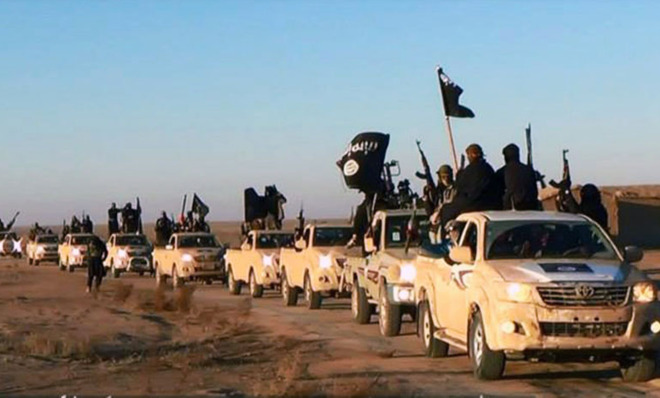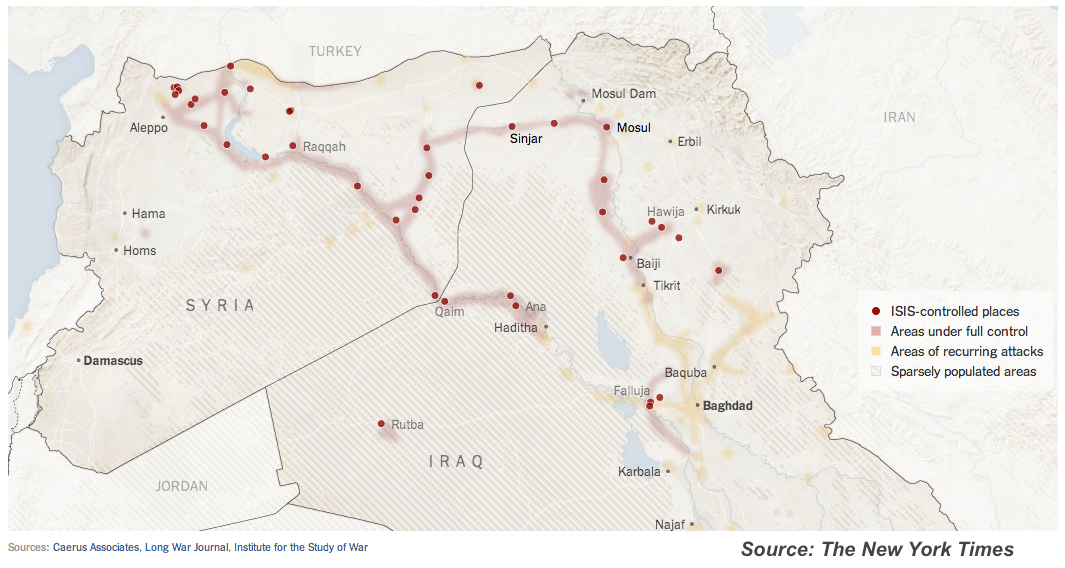Why the West should accept ISIS as a sovereign nation
It might just be the best way to defeat them. After all, you can't fight a war against an imaginary caliphate.


Everybody is worried about the Islamic State of Iraq and Syria, and nobody really knows exactly how to contain and reduce the threat from the demonstrably bloody and probably genocidal Islamist militia.
In a few short months, ISIS swept into Iraq from Syria and captured a huge chunk of the country, in the process racking up a sizable cache of U.S.-made weapons, hundreds of millions of dollars in booty, and shockingly powerful momentum. Kurdish peshmerga troops and Iraqi special forces, with a big assist from U.S. air power, seemed to have stopped that momentum, at least for now. Allies are coming off the bench to aid the effort — Britain, Australia, France, and Germany, to name a few. Even Iran is offering its help (for a price). But since ISIS controls a lot of territory in Syria, too — where U.S. and allied aircraft don't have permission to drop bombs — the West is somewhat flummoxed about what to do next.
So here's an idea: ISIS's ultimate goal is an Islamist caliphate ruled using strict sharia law — a sovereign land of their own. Let's give it to them.
The Week
Escape your echo chamber. Get the facts behind the news, plus analysis from multiple perspectives.

Sign up for The Week's Free Newsletters
From our morning news briefing to a weekly Good News Newsletter, get the best of The Week delivered directly to your inbox.
From our morning news briefing to a weekly Good News Newsletter, get the best of The Week delivered directly to your inbox.
Why? Because you can't really defeat a borderless militia, an ideology like militant political Islam, or a tactic like terrorism. But you can beat a nation state with a capital, defined borders, and an armed fighting force. You can also declare war on such a state, and declare victory if you conquer it.
The U.S. and another nations that want to neuter ISIS should recognize Islamic State as just that, a sovereign state, with Abu Bakr al-Baghdadi as head of state and whomever he chooses as head of government — or he could be both, like the U.S. president. He can pick his capital within the territory ISIS now controls, formalize his system of government, and codify his legal system. Then, the U.S. Congress can flex its long-dormant war-declaring muscle, and America can fight Islamic State the old fashioned way.
Presumably, it wouldn't be hard to get ISIS to declare itself a sovereign state — it's their stated goal, after all. So next we'd have to agree on the borders of the new Islamic State. A good starting point would be the territory ISIS controls now — but that's not as cut-and-dry as it sounds, as Kathy Gilsinan explains at The Atlantic. This map from The New York Times provides a pretty good sense of how Islamic State might look now:

The advantages of the plan are pretty clear. Once war is declared, ISIS's enemy nations can attack anywhere in the country, pursuant to the laws of war. ISIS militants and the Islamist warriors who came to help would all be in one place. It plays to the strengths of established nation states with superior weaponry. The defined borders give the conflict shape, and a government to topple gives it a well-defined goal.
A free daily email with the biggest news stories of the day – and the best features from TheWeek.com
And assuming the war is relatively short and fought through the air, dissolving Islamic State shouldn't be too hard — the conquered country splits into two parts, and each part rejoins the nation it was carved out of.
Are there downsides? Of course. As the wars against Iraq and in Afghanistan painfully demonstrated, the cleanup phase is often harder than the actual conquest. The plan would inevitably involve ground troops, probably from the U.S. as well as other nations, and that almost certainly means U.S. casualties, especially in areas of urban warfare, not to mention untold (and unintended) civilian casualties among innocent Syrians and Iraqis. Congress would have to actually declare war. And there may be unforeseen consequences of granting Islamic State sovereign legitimacy.
The biggest obstacle to the plan, though, may be that it is ridiculous. If it were a viable plan, hopefully, they would already be discussing it in the Pentagon and State Department. But here's the thing: When it comes to ISIS, the options range from the bad to the absurd. If America and its allies give ISIS what it wants — a country — at least the path is clear, the rules are in place, and the end is something we'd all recognize as an ending.
From the Sept. 11 attacks in 2001 onward, al Qaeda and its allies have been very effective in bringing the U.S. to its doorstep — watch how ISIS is drawing the U.S. back into Iraq, and possibly into Syria. Through design or happenstance, American intervention and the weakening of regional despots has worked out very well for ISIS and other Islamist militias. Maybe it's time for the U.S. to stop being reactive and come up with a clever plan of its own.
Peter has worked as a news and culture writer and editor at The Week since the site's launch in 2008. He covers politics, world affairs, religion and cultural currents. His journalism career began as a copy editor at a financial newswire and has included editorial positions at The New York Times Magazine, Facts on File, and Oregon State University.
-
 A running list of the US government figures Donald Trump has pardoned
A running list of the US government figures Donald Trump has pardonedin depth Clearing the slate for his favorite elected officials
-
 Ski town strikers fight rising cost of living
Ski town strikers fight rising cost of livingThe Explainer Telluride is the latest ski resort experiencing an instructor strike
-
 ‘Space is one of the few areas of bipartisan agreement in Washington’
‘Space is one of the few areas of bipartisan agreement in Washington’Instant Opinion Opinion, comment and editorials of the day
